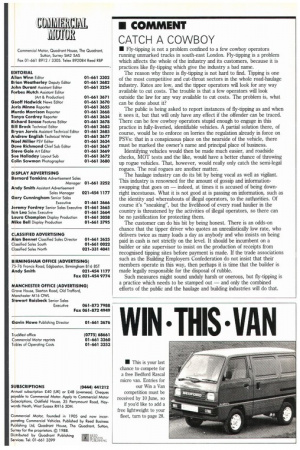• COMMENT CATCH A COWBOY
Page 5

If you've noticed an error in this article please click here to report it so we can fix it.
• Fly-tipping is not a problem confined to a few cowboy operators running unmarked trucks in south-east London. Fly-tipping is a problem which affects the whole of the industry and its customers, because it is practices like fly-tipping which give the industry a bad name.
The reason why there is fly-tipping is not hard to find. Tipping is one of the most competitive and cut-throat sectors in the whole road-haulage industry. Rates are low, and the tipper operators will look for any way available to cut costs. The trouble is that a few operators will look outside the law for any way available to cut costs. The problem is, what can be done about it?
The public is being asked to report instances of fly-tipping as and when it sees it, but that will only have any effect if the offender can be traced. There can be few cowboy operators stupid enough to engage in this practice in fully-liveried, identifiable vehicles. A partial solution there, of course, would be to enforce on lorries the regulation already in force on PSVs: that in a conspicuous place on the nearside of the vehicle, there must be marked the owner's name and principal place of business.
Identifying vehicles would then be made much easier, and roadside checks, MOT tests and the like, would have a better chance of throwing up rogue vehicles. That, however, would really only catch the semi-legal rogues. The real rogues are another matter.
The haulage industry can do its bit by being vocal as well as vigilant. This industry is renowned for the amount of gossip and informationswapping that goes on — indeed, at times it is accused of being downright incestuous. What it is not good at is passing on information, such as the identity and whereabouts of illegal operators, to the authorities. Of course it's "sneaking", but the livelihood of every road haulier in the country is threatened by the activities of illegal operators, so there can be no justification for protecting them.
The customer can do his bit by being honest. There is an odds-on chance that the tipper driver who quotes an unrealistically low rate, who delivers twice as many loads a day as anybody and who insists on being paid in cash is not strictly on the level. It should be incumbent on a builder or site supervisor to insist on the production of receipts from recognised tipping sites before payment is made. If the trade associations such as the Building Employers Confederation do not insist that their members operate in this way, then perhaps it is time that the builder is made legally responsible for the disposal of rubble.
Such measures might sound unduly harsh or onerous, but fly-tipping is a practice which needs to be stamped out — and only the combined efforts of the public and the haulage and building industries will do that.
















































































































